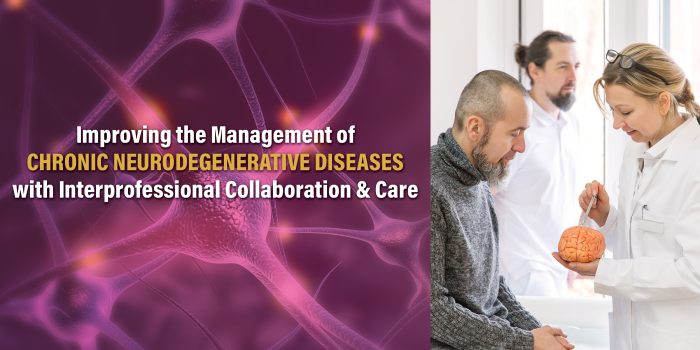
Multiple sclerosis (MS) and Parkinson’s disease (PD) are 2 highly prevalent chronic progressive neurodegenerative disorders. The former is an inflammatory autoimmune disease of the central nervous system (CNS) defined by the destruction of axonal myelin sheaths.[i] On the other hand, the pathological hallmark of the latter is the loss of the dopaminergic neurons in the pars compact of the substantia nigra, with neurodegeneration occurring in most areas of the CNS and parts of the peripheral nervous system (PNS).[ii] Over time, the accumulation and subsequent worsening of the symptoms associated with these diseases can result in disability, impaired quality of life, loss of independence, and an increased burden on caregivers. Given the complex needs of patients with either MS or PD and their families, interprofessional teams are best suited to ensure that care is comprehensive and coordinated.[iii]
Although revisions to diagnostic criteria have made it easier to identify patients with MS early in its course, and the introduction of disease-modifying therapies have made it possible to alter its natural history, MS management is extremely complex; there is no definitive treatment algorithm and the myriad of motor, sensory, visual, and/or autonomic symptoms represent a significant challenge. As such, coordinating the efforts of health professionals trained to treat MS from various disciplines provides patients with neurological and nursing care, individual and family counseling and education, physical, occupational, and speech therapies, and social services.[iv] An interprofessional team-based approach to MS care also helps facilitate coordination of services and continuity of care, while avoiding duplication and fragmentation for the patient and family.
Click here to learn more about interprofessional collaboration and care in MS management and earn CE credit!
While PD is still primarily considered a movement disorder, it is also associated with a broad spectrum of non-motor symptoms (NMS), including autonomic dysfunction, cognitive symptoms, psychiatric disorders, fatigue, and sleep disturbances.[v] In the later stages of this disease, NMS becomes a constant focus for patients, families, and people who provide nursing in the care of patients.[vi] The complexity of NMS, as well as PD-associated motor features necessitates a coordinated effort from an interprofessional care team comprised of neurology and allied healthcare professionals.[vii] Evidence demonstrating the potential benefits of such an approach aimed at delivering personalized care for patients with PD continues to emerge.[viii],[ix]
Click here to learn more about the interprofessional management of NMS in patients with PD and earn CE credit!
[i] Ward M, Goldman M. Continuum (Minneap Minn). 2022;28(4):988-1005.
[ii] Nalls MA, et al. Lancet Neurol. 2015;14(10):1002-1009.
[iii] Reeves S, et al. Cochrane Database Syst Rev. 2017;6(6):CD000072.
[iv] Soelberg Sorensen P, et al. Mult Scler. 2019;25(5):627-636.
[v] Seppi K, et al. Mov Disord. 2019;34(2):180-198.
[vi] Mosley PE, et al. J Geriatr Psychiatry Neurol. 2017;30(5):235-252.
[vii] Radder DLM, et al. J Parkinsons Dis. 2020;10(3):1087-1098.
[viii] Titova N, Chaudhuri KR. Int Rev Neurobiol. 2017;134:1257-1281.
[ix] Qamar MA, et al. Int Rev Neurobiol. 2017;132:511-523.
Share on Social Media